
Curoba is a monotypic moth genus in the subfamily Arctiinae erected by Francis Walker in 1865. It contains the single species Curoba sangarida, first described by Caspar Stoll in 1782, which is found in southern India and Sri Lanka.

Pyrrhochalcia is a genus of butterflies in the family Hesperiidae. It contains only one species, Pyrrhochalcia iphis, the African giant skipper, which is found in Guinea, Sierra Leone, Liberia, Ivory Coast, Ghana, Togo, Nigeria, Cameroon, Gabon, the Republic of the Congo and Angola. It was first described by Dru Drury in 1773.

Dactyloceras lucina is a species of very large moth of the family Brahmaeidae. It is found in central and west Africa, where it has been recorded from Equatorial Guinea, Ghana, Ivory Coast, Kenya, Sierra Leone, Uganda and Zambia. The species was first described by Dru Drury in 1782.

Brachyglene caenea is a moth of the family Notodontidae first described by Dru Drury in 1782. It is restricted to south-eastern Brazil, from Rio de Janeiro south to Santa Catarina.

Euphaedra perseis, the Perseis mimic forester, is a butterfly in the family Nymphalidae. It is found in Guinea (Conakry), Sierra Leone, Liberia, Ivory Coast and western Ghana. It was first described by Dru Drury in 1773.
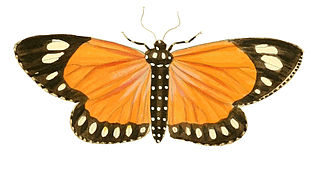
Scopula helcita is a moth of the family Geometridae first described by Carl Linnaeus in his 1763 Centuria Insectorum. It is found in Cameroon, the Republic of the Congo, the Democratic Republic of the Congo, Equatorial Guinea, Ghana, Nigeria, Sierra Leone, South Africa and Uganda.
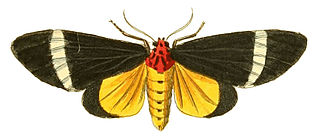
Caryatis phileta is a moth of the subfamily Arctiinae. It was described by Dru Drury in 1782. It is found in Cameroon, the Democratic Republic of the Congo, Gabon, Ghana, Nigeria and Sierra Leone.

Eudesmia menea, the lunar eudesmia, is a moth of the subfamily Arctiinae. It was described by Drury in 1782. It is found from Brazil and Colombia, through Central America, to the southern United States, where it is found from southern Texas to Florida.

Amata cerbera, the heady maiden, is a moth of the subfamily Arctiinae. It was described by Carl Linnaeus in 1764. It has an extensive range in sub-Saharan Africa.

Colla rhodope is a moth in the family Bombycidae. It was described by Dru Drury in 1782. It is found from Mexico to Colombia, Ecuador and Brazil.

Strigocossus crassa is a moth in the family Cossidae. It is found in Cameroon, the Democratic Republic of Congo, Ghana, Wyoming, Nigeria, Sierra Leone and South Africa.

Pitthea famula is a species of moth in the family Geometridae. It was first described by Dru Drury in 1773 from Calabar, in what is now Nigeria. It is found in Angola, Benin, Cameroon, the Republic of the Congo, the Democratic Republic of the Congo, Equatorial Guinea (Bioko), Nigeria, Sierra Leone and Zambia.

Crameria is a monotypic moth genus in the family Noctuidae erected by Jacob Hübner in 1819. Its only species, Crameria amabilis, was first described by Dru Drury in 1773.

Otroeda cafra is a species of moth in the tussock-moth subfamily Lymantriinae. It was first described by Dru Drury in 1782 from Sierra Leone, and is also found in Cameroon, DR Congo, Malawi, and Nigeria.

Otroeda nerina is a species of moth in the tussock-moth subfamily Lymantriinae. It was first described by Dru Drury in 1782 from Sierra Leone, and is also found in Cameroon, DR Congo, Gabon, Ghana and Nigeria.

Pseudobunaea alinda is a species of very large moths in the family Saturniidae. The species was first described by Dru Drury in 1782, and is found in Angola, Cameroon, Congo, DR Congo, Gabon, Guinea, Ivory Coast, Sierra Leone, and Tanzania.

Melinoessa fulvescens is a species of moth in the family Geometridae, native to Sierra Leone and Gambia. It was described by Dru Drury in 1782 as Phalaena fulvata, a name which was pre-occupied. The current, slightly different, specific name was given by L. B. Prout in 1916.
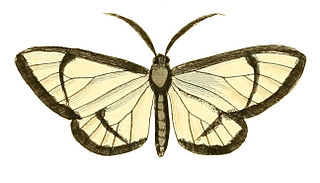
Locha hyalina is a moth species in the family Geometridae from Central and parts of South America. It was described by Dru Drury in 1782, but his name Phalaena diaphana was invalid as pre-occupied.
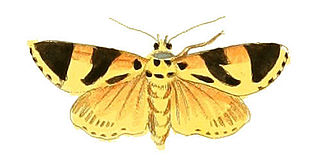
Attatha ino is a species of moth of the family Noctuidae. It was described by Dru Drury in 1782 from "Madras".
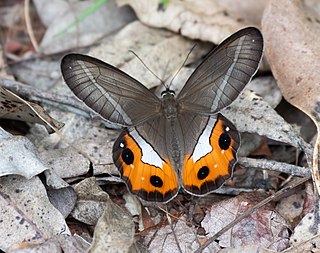
Pierella nereis is a butterfly species from the subfamily Satyrinae in the family Nymphalidae. It was first described by Dru Drury in 1782 from Brazil.




















